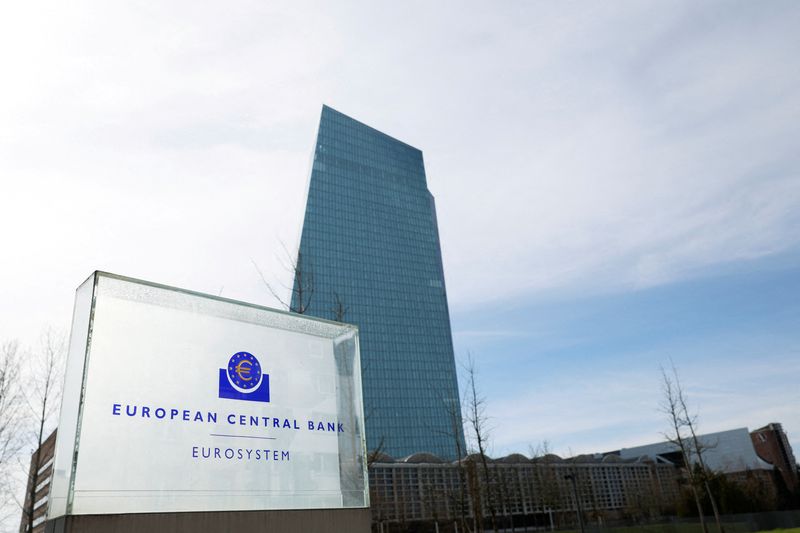By Indradip Ghosh
BENGALURU (Reuters) - The European Central Bank will cut interest rates in June, according to an overwhelming number of economists in a Reuters poll, but only a tiny majority now expect cumulative cuts of 100 basis points or more in 2024.
Although several ECB policymakers have supported rate reductions, most likely in June, President Christine Lagarde said the bank could not commit to following a first cut with more.
The speed of cuts is likely to depend largely on economic data, particularly inflation, still above the 2% target at 2.6% in February. Wage growth will also play a role.
All 77 economists in the March 25-28 Reuters poll expected the ECB to keep the deposit rate unchanged at 4.00% on April 11. Roughly 90%, 68 respondents, forecast the first cut would come in June.
That is in line with market pricing, and an increased majority compared with last month's survey.
"The central bank has clearly signalled June is the most likely timing for the first rate cut, but the path thereafter remains highly uncertain and the pace of easing will be totally data-dependent," said Marco Valli, chief European economist at UniCredit.
"We think that the ECB will want to tread carefully and we confirm our expectation there will be three 25bp rate cuts this year, one per quarter, followed by similar steps next year until a more neutral level is reached, probably in the 2% area."
The U.S. Federal Reserve was also expected to start cutting rates in June, although there was a significant risk it would wait until later in the year.
Only nine of 77 economists in the latest Reuters poll said the ECB would wait until after June to begin cutting rates.
Still, 19 of 34 respondents to an additional question said the first rate cut was more likely to come later than expected, rather than earlier.
Inflation will ease further over coming quarters but not hit the central bank's 2% target until Q2 2025, the poll indicated.
A gauge of wages - compensation per employee - is currently rising at an annual rate of 4.6% and has remained well above the 3% level the ECB considers to be in harmony with 2% inflation.
NO CLEAR VIEW BEYOND JUNE
However, there was no clear consensus on the extent of the rate cuts the ECB would make this year. Just over half, 39 of 77 economists, expected a total 100 basis points or more of reductions. The other 38 said 75 basis points or less.
In a Reuters survey last month, around 56% predicted 100 basis points of cuts or more.
Nineteen of 34 respondents said it was more likely there would be fewer cuts this year than they expected, while the rest said more.
"We are in this situation in which the economy is moving horizontally and where rate cuts, or more aggressive rate cuts, would not make a difference for growth," said Carsten Brzeski, global head of macro at ING. "This is why I expect the ECB to be very cautious and gradual."
Recent business surveys suggested economic activity in the 20-country euro zone had rebounded since the start of the year, an encouragement for the ECB to wait longer.

Euro zone economic growth, which stagnated last quarter, was seen at 0.1% and 0.2% in Q1 and Q2, respectively, and averaging 0.5% this year and 1.3% next.
(For other stories from the Reuters global economic poll:)